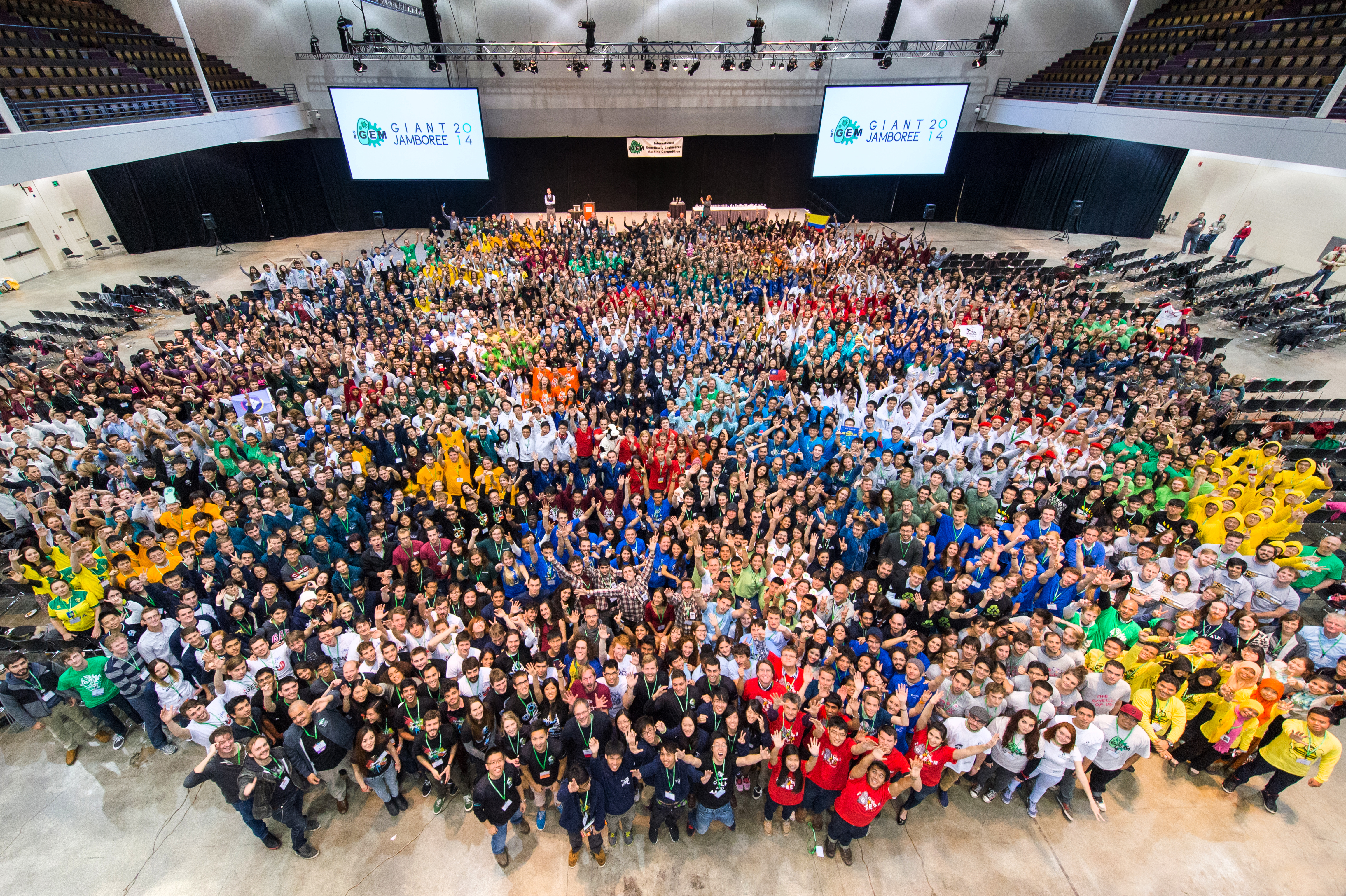The UCLA iGEM team is an undergraduate research team that explores the field of synthetic biology. We’re a group of students with majors from the physical, life, and engineering sciences, brought together by the equally-diverse field of synthetic biology. As the only student-run research team on campus, we take pride in being able to plan, execute and present our own projects as undergraduates in the iGEM competition.
The International Genetically Engineered Machine (iGEM) competition draws over 200 university teams from all over the world each year, making it the world’s premier undergraduate synthetic biology conference. This competition encourages teams to creatively challenge major scientific problems, utilizing and contributing to the BioBrick repository -- the largest, open-source collection of genetic parts that continues to grow each year.

We run and operate our own laboratory to design and engineer a synthetic biology project. Beyond our primary goal of competing in iGEM, we are also developing a new model of science education -- a program in which students brainstorm, carry out, and troubleshoot a novel project from beginning to end. We are establishing a tradition here at UCLA of student-led and student-run research.
This year, our team is working on altering and producing synthetic silks in bacteria. Silk is a material that nature has already designed to be incredibly strong and elastic. We aim to take it a step further using synthetic biology techniques, to create silks with enhanced properties and new functions. We endeavor to create customizable fibers such as silk threads that can carry therapeutic molecules and serve as enhanced sutures. On the flashier side, we are also trying to create glowing silk threads as a high end fashion material. With a material as versatile as silk, the potential applications are endless.
We are a completely student-led and run research group and are passionate about science and extremely excited to achieve our goals. But none of this would be possible without funding. Here is where we need your help. Your financial support will help us purchase reagents to conduct our research and pay for the costs of the competition. We believe that the greatest scientific discoveries happen collaboratively, and urge you to join in our efforts. Working together, it is possible to better our society both through scientific discovery and by promoting education and learning. Your generous gift will help foster the growth of the next generation of scientists, thinkers and problem solvers.
If you like what we're doing, please share our campaign with your family and friends! Also, follow us on Facebook and Twitter for more information and updates!
Thank you for your generous support! Your donations will make it possible for us to advance and succeed in our scientific endeavors.
In case you were wondering about some of the things mentioned in the perks!
Primers - Primers are short pieces of DNA that serve as the starting point for polymerase chain reaction, a process that makes many copies of a target DNA sequence.
Micropipette - A micropipette is a tool used to dispense accurate volumes of liquid. Biologists use it almost all of their experiments and protocols.
Agar - Agar is an algae derivative that is made into gels to feed bacteria. It’s also commonly used as an ingredient in desserts such as jelly and pudding, but our bacteria don’t need anything as fancy as that!
Recombinant proteins - Recombinant proteins are ones that are created by an organism that normally wouldn’t produce it. For example, we are using bacteria to generate recombinant silk - a material that is normally generated by spiders.
Nickel columns - Many recombinant proteins are produced with short tags that allow them to bind to certain metals, such as nickel. This allows scientists to use nickel columns to purify recombinantly produced protein, since other proteins and materials don’t bind to nickel.
Biobrick - Biobricks are standardized DNA parts that are designed to be assembled together to create a system. They're the essential nuts and bolts of iGEM projects, and are catalogued and documented in the iGEM Registry.
$10 will allow us to buy one pair of primers for amplifying DNA! As thanks, we'll give you a shout out on our Facebook page! (A $10 tax deductible gift)
$25 will allow us to restore one micropipette back to working order! As thanks, we'll give you a shout out on Twitter! All perks from lower giving levels are included! (A $25 tax deductible gift)
$50 will let us buy agar powder to grow our bacteria! To thank you, we'd like to send you a handwritten letter of thanks! All perks from lower giving levels are included! (A $50 tax deductible gift)
$100 will allow us to synthesize a single DNA part to use as a genetic building block! To show our appreciation, we'll send a UCLA iGEM T-shirt your way! All perks from lower giving levels are included! (An $91 tax deductible gift)
$250 will allow us to purchase nickel columns to purify our recombinant silk! We'll list you as one of our sponsors on our website and project wiki! All perks from lower giving levels are included! (A $241 tax deductible gift)
$500 will allow us to buy an extraction reagent kit to purify the DNA that we create! As thanks, we'll invite you to have a discussion with us, either in person or through videochat! We would love to talk with you about synthetic biology or anything else in general. All perks from lower giving levels are included! (A $491 tax deductible gift)
You just funded our protein manufacturing and characterization! To show our gratitude, we'll allow you to name one of our finalized Biobrick parts to be submitted in iGEM registry! All perks from lower giving levels are included! (A $991 tax deductible gift)